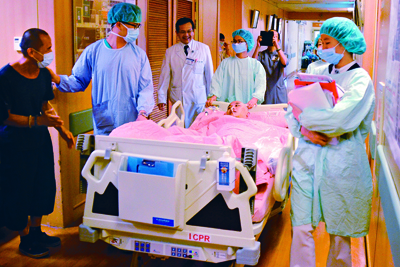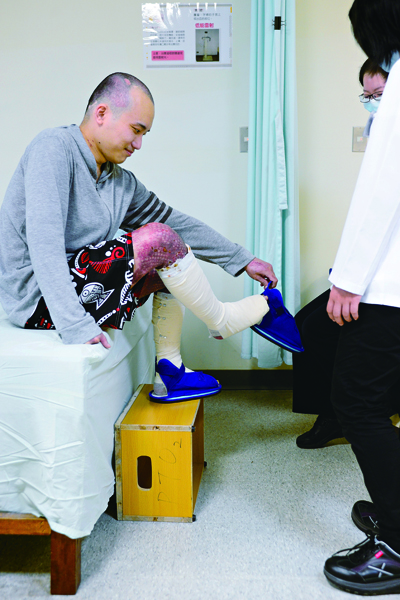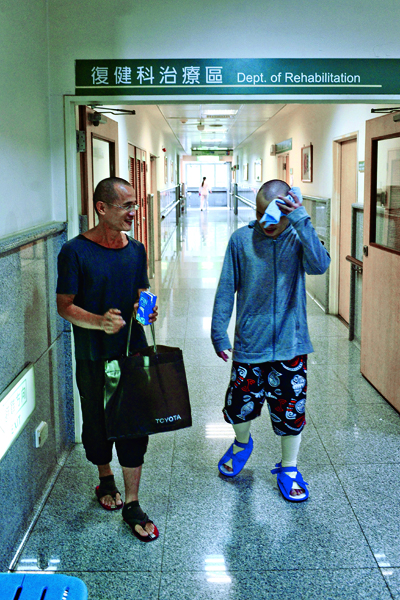

| Learning to Walk and Rock Again |
| By Huang Xiu-hua Translated by Tang Yau-yang Photos by Yan Lin-zhao |
Under the direction of a physical therapist, Zi-xian works hard at Dalin Tzu Chi Hospital. The explosion burned 76 percent of his total body surface area and left him hospitalized for 45 days. Although his mobility has been severely curtailed, he does not concede defeat. He is moving courageously forward on his arduous road to recovery. Huang Zi-xian (黃子羨), 26, staggered into the rehabilitation department at Dalin Tzu Chi Hospital, southern Taiwan. His youth made him stand out among a group of mostly older patients, but he did not mind when people threw extra glances at him. He has been visiting the department three times a week for rehabilitation therapy since the middle of August 2015. In the occupational therapy room, he strapped a one-kilogram (2.2-lb) weight onto each wrist, raised his right arm skyward, then moved it left over his head. He also picked up a small object, raised his arm high, and placed the object on top of a large mirror frame. He repeated the prescribed exercises over and over again so that his arm muscles would stretch out and he could avoid contractures and tightness. In the physical therapy room, Zi-xian stepped on a balance board, grabbed hold of a rail, and squatted down. His legs were very sore and the tightness in his knees made the posture painful, but the pain and soreness were bearable. Then he rose and walked a straight line. A therapist reminded him to take longer strides. Next, he walked backwards, his steps a bit wobbly. All this training was to strengthen the muscles around his knees, ankles, and heels. His legs had suffered the worst burns of his entire body in the explosion. He had to start early on his rehab, because if he waited for his wounds to fully heal, it would be doubly hard to stretch them out. His session ended after two hours. Tired and sweaty, he walked towards the entrance of the hospital to wait for his father to pick him up. On the way, he had to stop to rest and rub his knees before he continued. Needing to rest during such a short walk was unimaginable for an exercise nut like Zi-xian. He used to run and jump all he wanted without feeling tired. Now the burns have changed things. He cannot do many of the things that he could easily do before; his mobility is so restricted it seems as if he were bound by invisible shackles. He knows that this physical impairment will only be temporary if he works hard to overcome it. This down time has also given him a chance to see his home and family in a new light. He used to come home more like a visitor than a son. Often his visits were short. This brush with the explosion and fires has offered him the opportunity to stay home and spend more time with his family. He has noticed that his father is getting old. He knows that, given his age, it is high time that he grew up and matured. The explosion Zi-xian grew up in Beigang, Yunlin, central Taiwan. He is cheerful and easy-going. In college, he formed a pop music club and was the lead singer in a band. He preferred heavy metal. After graduating from college, he worked in northern Taiwan at various jobs, such as a real estate agent and security guard. On the fateful day of the explosion, his friends invited him along to a “Color Play Asia” party at the Formosa Fun Coast recreational water park in Bali, New Taipei City. They had purchased four tickets and had an extra one for him. He went with them. Little did he know that heaven was about to throw a big challenge his way. Zi-xian was standing near the front of the throng of young people at the party. In line with the party theme, colored corn starch powder was sprayed into the air. Suddenly, fires broke out in front of the music stage. The flames quickly expanded into a sea of fire. Zi-xian took a deep breath and ran for his life. He ran very fast, feeling no pain, only heat. It was only when he had gotten to a safe place that he noticed that the skin on the bottom of his feet had almost peeled off. His legs were covered in blood. Groans and screams surrounded him. His companions were nowhere to be seen. He saw a big barrel for canned beverages. Exhausted, he crawled toward the barrel to soak in the water. Not long after, he was lifted out of it and deposited into a lazy river where he soaked with many other injured people. “I was very sleepy, but people just wouldn’t let me sleep,” Zi-xian recalled. They were afraid that he would go into shock, so they kept him awake. A female Tzu Chi volunteer comforted him by saying, “Don’t be afraid.” He waited almost three hours before finally being picked up by an ambulance. It was after eleven o’clock that night when he arrived at Taipei Tzu Chi Hospital. He did not have his cell phone with him, and he could not remember his parents’ numbers. He only remembered the number at his childhood home. When social worker Lin Jia-de (*L.a<w) called that number, Zi-xian’s 93-year-old grandmother answered the phone. So incredible was Lin’s account that his grandma thought the call was a prank and ignored it. Lin resorted to using Facebook to broadcast Zi-xian’s situation, hoping that it would lead to contact with his family. Eventually, a friend of Zi-xian’s was able to pass on the information to Zi-xian’s father, Mr. Huang, who was at a Buddhist retreat when word came to him of his son’s accident. He arrived at the hospital the following morning. Mr. Huang and a friend of Zi-xian’s went to the ICU to see his son. The friend couldn’t help but break into tears when he saw Zi-xian with burns over 76 percent of his body. Zi-xian was indeed seriously injured—his doctor had declared him in critical condition. But Zi-xian himself seemed to be in better shape than the doctors believed. He saw his friend cry for him, but he thought to himself, “I don’t have chest pains or heart palpitations. I’m clear-headed and breathing normally. I should be all right.” The treatment Zi-xian had covered his nose and mouth when the explosion hit, so he was able to lessen the extent and severity of inhalation injuries. He was as a result spared the discomfort of intubation. Even so, his extensive burns made changing his dressings an excruciating ordeal. He readily admitted that the mere sight of approaching nurses made him sweat blood because, he said, “It simply hurt too badly.” Just as bad were the wound-cleaning procedures, which left him cold and weak. When he was pushed back to the ICU after such a procedure, even three layers of covers and a heat lamp could barely keep him warm. He often suffered extreme pain that called for analgesics. When the pain relented, he would look at what the nursing staff was doing. He noticed that they were busy non-stop. Patients received very good care. When they wanted water or to have a bowel movement, all they needed to do was press a button and a helper would show up. “I was almost like a disabled person, relying on others for every last thing I needed.” Zi-xian stayed in the ICU for nearly a month. He often had nothing to do, staring at the ceiling, feeling the long days inching by ever so slowly. Visiting hours—twice a day—were his favorite times during those long days. To stave off the risk of infection, visitors—his family and friends—were not actually allowed into his room. Instead, they saw and talked to him via video conferencing. Zi-xian’s father would read him the warm wishes that he had copied down from Zi-xian’s Facebook page. Those brought him great comfort. Zi-xian said that throughout it all he had great confidence in his recovery and he always tried to think positively. “It never occurred to me that I might die from this. I always believed that I’d recover.” When his psychologist asked him if he had ever had a nightmare about the incident or experienced a panic attack, he always said no. It was no surprise that his caregivers gave him the nickname “Mr. Calm.” Zi-xian’s positive attitude was reflected in his physical well-being, and he recovered remarkably well after two skin-graft surgeries. When he was about to be transferred from the ICU into a regular ward, he would ask the nurses who cared for him where they lived and when they got off work. It was a way to show his care for them. Though he did not say it, he really appreciated what they had done for him.
Zi-xian was rolled out of the ICU to a regular ward at Taipei Tzu Chi Hospital in late July. His father, left, welcomed him out of the ICU with joy. The recovery Zi-xian described his transfer out of the ICU: “It was like stepping out of darkness into light.” The move brought his old, energetic self back to life. Everybody was amazed at his transformation. Many people brought food to eat with him, and a wall in his room was soon covered with photographs and encouraging messages and best wishes from his friends. He tried to get out of bed and stand, but he found that he was very wobbly, undoubtedly due to the long time that he had been lying in bed. In a few days, most of the needles and tubes that had been attached to him had been removed, and he began to learn to stand and walk with the assistance of a walker and the guidance of a rehabilitation therapist. With time and practice, his steps grew firmer and surer.
Bending over to put on a shoe, like many other mundane things, became difficult for Zi-xian to do after he was injured. A father’s love When Zi-xian was in the ICU, his father chanted sutras every day to pray for blessings, and he dedicated the merits he accumulated to his son and all the other victims. When Zi-xian was moved from the ICU to a regular ward, he depended a lot on his father’s care. His recovery would have been much more difficult had Mr. Huang not taken such good care of him. For example, his father helped feed him each day when he was first transferred out of the ICU. Zi-xian had to rely on a feeding tube, a very time-consuming process. Each bottle of protein-rich drink would take Mr. Huang a long time to administer. After each feeding, he would wash the feeding tube, sterilize it with boiling water, and then put it in a refrigerator. All this would be repeated just an hour later. It would usually be one o’clock in the morning by the time he finished six bottles. A good night’s sleep, though, would not follow. If Zi-xian needed to go to the bathroom, Mr. Huang would have to walk him there or get the bedpan for him. Since Zi-xian’s diet was primarily liquid, his stool was often watery. If his father changed his diaper and discovered a leak, he would immediately change the bedsheets. The grown son needed to be cared for like an infant again. Mr. Huang did so without complaining, despite his fatigue. The demand of caring for a severely injured patient only made him appreciate more the hard work that the staff at the ICU put in for his son, day after day. “Caring for me has really exhausted Dad,” Zi-xian said. His father, a devoted Buddhist, had always given him considerable latitude to do as he wanted; his only request of him was to be a good and kind person. Though largely hands off in his approach to child rearing, he was always available to help when his son needed him—and he still is. Zi-xian, on the other hand, rarely expressed his love for his father, but he always kept him posted on what he was up to. The two have maintained a relationship that is inwardly connected if less outwardly intimate. Zi-xian has made a lot of friends over the years, and many of them visited him at the hospital. That made his father proud. Mr. Huang has remained relatively calm facing the disaster and his son’s injuries. He stresses that emotions will not help matters, that anger and distress cannot undo the harm. “Feeling bad won’t change what’s happened. Accepting it bravely is the way to go,” he said. “Your suffering will help you better empathize with the pain of other people. I hope that Zi-xian understands this deeper meaning of life from his brush with this disaster.” “He’s always taught me by example rather than by words,” Zi-xian said of his father, who had retired early from his teaching post at a college in order to care for his own sick father. Later, in order to care for his mother, he rarely traveled far from home. This time, he stayed in Taipei for more than 40 days to minister to Zi-xian, a record for him to be away from home for so long. “I’m the one that dragged him into this,” Zi-xian said, “but few people could have cared for me as well as he did. He did a good job learning from the nurses. Among other things, he became quite an expert at changing bedsheets.” His father’s meticulous care for him has continued since he was discharged from the hospital. At home now in Beigang, his dad prepares meals and snacks for him, changes his dressings, and drives him to Dalin Tzu Chi Hospital every other day for rehab. To better care for his son, Mr. Huang learned from members of the Sunshine Social Welfare Foundation how to handle the scaly skin on a wound: First cover the wound with gauze, then douse the gauze with saline solution. Let it soak for three to five minutes. Then remove the gauze, and gently run your hand over the skin. Flakes will fall off easily, leaving the skin soft and shiny. After that, Mr. Huang applies baby oil or lotion to reduce itching. One can see in such good care a father’s deep love for his son. The terrible event has no doubt been agony for Zi-xian and his family, but it has nonetheless offered a unique opportunity for him to bond with his father. In the last six years, Zi-xian, away from home for school and work, rarely spent time with his father. This incident has brought them closer together and made Zi-xian further realize the importance of family.
Zi-xian is sweaty and tired after a two-hour rehab session, but he takes it all in stride. He is thankful for his father’s good care, which helps him walk with surer steps on the road to recovery. Adjusting Seeing how his dad ministers to him, Zi-xian has nothing but gratitude in his heart. At the same time, he makes a point of urging friends who visit him to love life, stay out of harm’s way, and avoid dragging their families into such a mess. He says those words from the bottom of his heart. He stresses that if his injury could serve as a reminder for people to watch their safety, then his suffering would be worth it. The burns are sure to leave behind scars, but those do not bother him much. “What are a few scars to a man?” he asked. “The most important thing is to maintain bodily functions.” People sometimes give him curious looks in the halls of Dalin Tzu Chi Hospital or even ask him if he was burned in that water park explosion. Instead of shying away, he readily acknowledges his injuries. The strangers often cheer him on. One’s attitude decides everything. Zi-xian does not want to live in the shadow of the accident. He wants to be out in the sunshine and out among people. He works hard at rehab, and he hopes to return to society in one or two years. His wounds now cover less than ten percent of his body, but it still hurts a lot when he extends his legs, and he has to first bend over so he can stand steadily when he gets out of bed. He claims that he has a very high threshold for pain and his pains nowadays are nothing compared with what he went through before. “If changing a dressing is a nine on a pain scale of one to ten, rehab is just one.” His legs suffered more serious burns—third degree—than any other part of his body. The burns on his chest, back, and upper limbs were rated second degree. He is glad that his fingers are not injured, which allows him to do many things, including scratching his own back. Though his legs are still largely bandaged, he faces his future with courage. He is not afraid of what lies ahead, and he intends to overcome one obstacle after another. He is convinced that though the scars on the outside will remain forever, the scars inside will gradually heal completely. His father advises him, “I hope that in the future you will see in other people’s suffering your responsibility to help them.” What wise words! “I’ll remember that,” Zi-xian says. “I’ll help others, and fill my life with meaning and purpose.” |



















|

.jpg)


